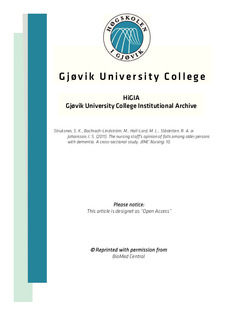The nursing staff's opinion of falls among older persons with dementia. A cross-sectional study
Struksnes, Solveig; Bachrach-Lindström, Margareta; Hall-Lord, Marie Louise; Slåsletten, Randi Aasen; Johansson, Inger Signe
Journal article, Peer reviewed
Permanent lenke
http://hdl.handle.net/11250/142456Utgivelsesdato
2011Metadata
Vis full innførselSamlinger
Originalversjon
Struksnes, S. K., Bachrach-Lindström, M., Hall-Lord, M. L., Slåsletten, R. A. & Johansson, I. S. (2011). The nursing staff's opinion of falls among older persons with dementia. A cross-sectional study. BMC Nursing, 10. http://dx.doi.org/10.1186/1472-6955-10-13Sammendrag
Background Falls are common among older people and persons with dementia constitute an additional risk group. The aim of this study was to describe the nursing staff's opinion of caring for older persons with dementia with the focus on causes of falls, fall-preventing interventions, routines of documentation and report and the nursing staff's experiences and reactions when fall incidents occur. A further aim was to compare these areas between registered nurses (RNs) and enrolled nurses (ENs) and staff with [less than or equal to] 5 and [more than] 5 years of employment in the care units in question. Methods The study had a cross-sectional design and included nursing staff (n=63, response rate 66%) working in four special care units for older persons with dementia. Data collection was conducted with a questionnaire consisting of 64 questions. Results The respondents reported that the individuals' mental and physical impairment constitute the most frequent causes of falls. The findings also revealed a lack of, or uncertainty about, routines of documentation and reporting fall-risk and fall-preventing interventions. Respondents who had been employed in the care units more than five years reported to a higher degree that colours and material on floors caused falls. RNs considered the residents' autonomy and freedom of movement as a cause of falls to a significantly higher degree than ENs. RNs also reported a significantly longer time than ENs before fall incidents were discovered, and they used conversation and closeness as fall-preventing interventions to a significantly higher degree than ENs. Conclusions Individual factors were the most common causes to falls according to the nursing staff. RNs used closeness and dialog as interventions to a significantly higher degree to prevent falls than ENs. Caring of for older people with dementia consisted of a comprehensive on-going assessment by the nursing staff to balance the residents' autonomy-versus-control to minimise fall-risk. This ethical dilemma should initiate development of feasible routines of systematic risk-assessment, report and documentation.
Beskrivelse
This is the journal's version originally published in BMC Nursing. This article is designet as ”Open Access”. © BioMed Central: http://www.biomedcentral.com/bmcnurs
